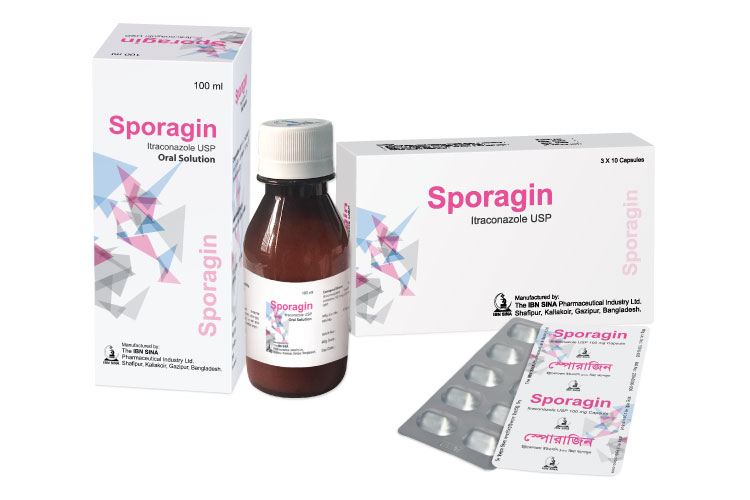
SPORAGIN
ITRACONAZOLE USP
| NAME | STRENGTH | PACK SIZE | DOSAGE FORM |
|---|---|---|---|
| SPORAGIN 10 MG/ML | 10 MG/ML | 100 ML | ORAL SOLUTION |
| SPORAGIN 100 MG | 100 MG | 30 S | CAPSULE |
Itraconazole Capsule 100 mg: Each capsule contains Itraconazole pellets equivalent to Itraconazole USP 100mg. Itraconazole Oral solution: Each ml Itraconazole oral solution contains 10 mg of Itraconazole.
Itraconazole is an orally active triazole antifungal drug that has demonstrated a broad spectrum of activity and favorable pharmacokinetic profile. Itraconazole inhibits Cytochrome P-450 dependent enzymes resulting in impairment of the biosynthesis of ergosterol, a major component of the cell membrane of yeast and fungal cells.
Capsule:Itraconazole is used for the treatment of oropharyngeal candidiasis, vulvovaginal candidiasis, pityriasis versicolor, tinea pedis, tinea cruris, tinea corporis, tinea manuum, onychomycosis, histoplasmosis. It is indicated in the treatment of systemic candidiasis, aspergillosis, and cryptococcosis (including cryptococcal meningitis). It is also used for maintenance therapy in AIDS patients to prevent relapse of underlying fungal infections and in the prevention of fungal infection during prolonged neutropenia. Oral Solution: Itraconazoleoral Oral Solution is indicated for the treatment of oropharyngeal and esophageal candidiasis.
Capsule: Oropharyngeal candidiasis: 100 mg daily (200 mg daily in AIDS or neutropenia) for 15 days. Vulvovaginal candidiasis: 200 mg twice daily for 1 day or 200 mg daily for 3 days. Pityriasis versicolor: 200 mg daily for 7 days.Tinea corporis and tinea cruris: either 100 mg daily for 15 days or 200 mg daily for 7 days. Tinea pedis and tinea manuum: either 100 mg daily for 30 days or 200 mg twice daily for 7 days. Onychomycosis: Either 200 mg daily for 3 months or 200 mg twice daily for 7 days(Course), subsequent courses repeated after 21 days interval. Fingernails two courses, toenails three courses. Systemic infections (aspergillosis, candidiasis and cryptococcosis including cryptococcal meningitis) where other antifungal drugs inappropriate or ineffective: 200 mg once daily, increased in invasive or disseminated disease and in cryptococcal meningitis to 200 mg twice daily. Histoplasmosis: 200 mg 1-2 times daily. Maintenance in AIDS patients to prevent relapse of underlying fungal infection and prophylaxis in neutropenia when standard therapy is inappropriate: 200 mg once daily, increased to 200 mg twice daily if low plasma Itraconazole concentration is detected.Oral solution:The solution should be vigorously swished in the mouth (10 ml at a time) for several seconds and swallowed. Oropharyngeal candidiasis: 200 mg (20 ml) daily for 1 to 2 weeks. Esophageal candidiasis: 100 mg (10 ml) daily for 3 weeks. Child dose: Fron 1 month to 11 years recommended dose is 3 to 5 mg/kg/day for 7 days to 30 days.
Itraconazole is contraindicated in patients with known hypersensitivity to the drug or any ingredient in the formulation. Itraconazole oral solution should not be administered to patients with evidence of ventricular dysfunction such as congestive heart failure (CHF) or a history of CHF except for the treatment of life-threatening or other serious infections. Patients who have severe hepatic disease are not advised to take Itraconazole.It is also contraindicated with Rifampicin therapy.
Absorption is impaired when gastric acidity is reduced. In patients receiving acid neutralizing medicines (e.g. aluminium hydroxide), these should be administered at least 2 hours after the intake of Itraconazole. The drug should be administered after a full meal. Rarely, cases of hepatitis and jaundice have been reported mainly in patients treated for longer than one month. It is therefore, advised to monitor liver function in patients receiving continuous treatment of more than one month.
Nausea, abdominal pain, dyspepsia, constipation, headache, dizziness, raised liver enzymes, menstrual disorders, allergic reactions, hepatitis and cholestatic jaundice, peripheral neuropathy and Stevens-Johnson syndrome reported. On prolonged use hypokalaemia, oedema and hair loss reported.
Pregnancy Category C. Itraconazole is not recommended during pregnancy & lactation.
For 1 month to 11 years recommended dose is 3 to 5 mg/kg/day.
Itraconazole inhibits the metabolism of Cyclosporine and Warfarin. Interaction with Terfinadine, Phenobarbitone, and Midazolam has been reported.
There are limited data on the outcomes of patients ingesting high doses of itraconazole
Store in a cool (below 30°C) and dry place. Keep away from light and out of reach of children.
Capsule: Each commercial box contains 3x10’s Capsule in Alu-Alu blister strip Pack.
Oral Solution: Each amber PET bottle contains 100 ml of Itraconazole oral solution.
